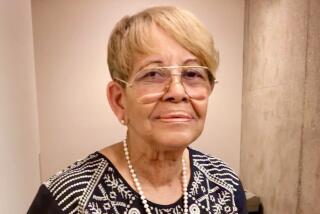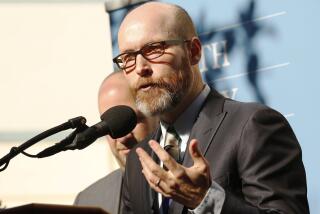Donald C. Alexander dies at 87; former IRS chief who battled Nixon administration
- Share via
Reporting from Washington — Donald C. Alexander, the Internal Revenue Service commissioner who successfully fought the Nixon administration’s attempts to use tax audits and investigations to punish its political enemies, died of cancer Tuesday at his home in Washington, D.C. He was 87.
Alexander ran the IRS from 1973 to 1977, when the agency came under severe public scrutiny for its earlier role in investigating political opponents and radicals on the far right and left. Alexander, a prominent tax lawyer when he took the IRS job, learned the day after his swearing-in of a secret band of IRS investigators who combed through the tax returns of 3,000 “notorious” groups and 8,000 individuals.
Within three months, he ordered the unit disbanded, saying that political views “extremist or otherwise, are irrelevant to taxation,” he wrote in a 1999 editorial for the publication Tax Notes. “The evening of the same day, President Nixon made his first effort to fire me.”
Alexander refused to launch tax audits of those on Nixon’s infamous “enemies list,” blocked an effort by the Agriculture Department to obtain the tax returns of all American farmers and sharply curtailed IRS participation in federal investigations into drug trafficking, organized crime and white collar crime. He repeatedly urged Congress to stiffen taxpayer confidentiality laws, which it did in 1976.
He later said restrictions on seeing tax returns were so lax that the IRS ran virtually “a lending library” of private tax data, and governors sometimes were shown tax records of their opponents.
Former Treasury Secretary George Shultz last week described Alexander as a “person of integrity.”
Alexander alerted Shultz in the early 1970s that Nixon’s name came up for an audit under the agency’s randomized process. “A few minutes later, he came back to me and said, ‘We thought you’d like to tell him yourself,’ ” Shultz recalled. “So I called Al Haig [the White House chief of staff]. . . . An hour later, he called me back to say the president is at Camp David, and he is up the wall over this -- the IRS never audits a president.”
Alexander proved that many previous presidents had been audited, and the Nixon audit went forward. It turned up a number of irregularities, which were leaked to the press and led to a special prosecutor’s investigation. In the end, it was determined that the president owed more than $400,000 in back taxes and penalties.
The only time Alexander met Nixon, he told Tax Notes in 2002, was when he attended a 1973 concert at the White House. “You have a very difficult job. Do it well, and do it honestly,” the president said.
“Later those words came in very handy,” Alexander added.
Donald Crichton Alexander was born May 22, 1921, in Pine Bluff, Ark., and graduated from Yale University. He served in the Army in Europe during World War II as a forward artillery observer and received the Silver Star and the Bronze Star.
After the war, he graduated from Harvard University law school and edited the law review. He worked at the Washington law firm of Covington and Burling until 1954, then moved to Cincinnati where he worked on tax law until 1973, when Nixon appointed him IRS commissioner.
After he left the IRS, Alexander worked for a series of New York and Washington law firms. He also served on numerous federal commissions.
Alexander remained in the public eye throughout the years, commenting on tax matters including President Clinton’s removal of gifts given to the White House and arguing against a 1995 proposal to use debt-collection agencies to recover unpaid taxes.
Alexander worked full time until last year, his son James said, putting in 80-hour weeks.
His wife of 52 years, Margaret S. Alexander, died in 1999. A son, Robert C. Alexander, died in 2004. In addition to his son James of New Haven, Conn., survivors include a granddaughter.
Sullivan writes for the Washington Post, where this obituary first appeared.
More to Read
Start your day right
Sign up for Essential California for the L.A. Times biggest news, features and recommendations in your inbox six days a week.
You may occasionally receive promotional content from the Los Angeles Times.






